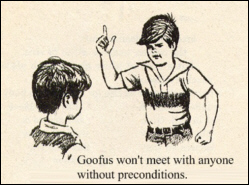[This is a guest post by attorney Caroline Belich. Caroline is a Chicago native, former Michigan State volleyball player, and recent admitee to the California bar with particular interest in the First Amendment.]
Zoosk Inc. v. Does, 2010 WL 5115670 (N.D. Cal. December 9, 2011)
The U.S. District Court for the Northern District of California recently issued an order allowing an internet service provider (ISP) to release an anonymous subscriber’s personal account information. Plaintiff Zoosk is an online social dating network. A Doe defendant created a profile and displayed nude pictures on the site, describing herself as an adult entertainer. After plaintiff permanently blocked the account for violating its terms of use policy, someone set up a Twitter account and posted some allegedly defamatory statements about plaintiff.
After filing a complaint alleging libel per se, Plaintiff asked for leave to take limited early discovery from two ISPs (Comcast and Time Warner Cable) to discover the identity of the Doe defendants. Under the Cable Communications Policy Act, a cable operator may disclose personal identifying information of a subscriber pursuant to a court order authorizing the disclosure. And pursuant to FRCP 26(f), a court may authorize early discovery before the Rule 26(f) conference if the plaintiff shows good cause.
Here the District Court granted the motion, finding that plaintiff showed good cause. First, plaintiff identified the potential Doe defendants with sufficient specificity by determining eight email addresses were using the Twitter account. And plaintiff was able to show how it discovered the emails using publicly-available information. Also, plaintiff’s claims were pleaded with enough particularity to withstand a motion to dismiss. Finally, early discovery was likely to lead to discovery of Doe defendants’ identities so process could be served, because both ISPs had personal information for the eight email addresses involved. As a result, the information these defendant-subscribers provided to Comcast and Time Warner for the sole purpose of using their internet services could also be used to identify them in this defamation claim.



![Reblog this post [with Zemanta]](http://img.zemanta.com/reblog_e.png?x-id=c979d9cb-0765-47b2-a007-3e54cc22e6f7)

